Court taking short recesspublished at 17:02 British Summer Time 29 March 2021
The courtroom is now taking a 20-minute morning break. The trial will resume shortly.
The teenager who made the viral video of his arrest gave emotional testimony
She told the trial she says sorry to Floyd at night for not doing more
Derek Chauvin was fired from the police after he was filmed with his knee on Floyd's neck
He denies murder and manslaughter
Another bystander earlier said he feared he was watching a murder
In opening statements, the defence said Floyd died from poor health and drug abuse
Floyd's death sparked a racial reckoning in the US and protests around the world
Holly Honderich, Max Matza, Sam Cabral and Marianna Brady
The courtroom is now taking a 20-minute morning break. The trial will resume shortly.
Barbara Plett Usher
BBC News, Minneapolis
Before the trial started there were two main messages from civil rights lawyers and members of George Floyd’s family:
1. A strong push-back against the defence's argument that Floyd died of a drug overdose: “He was walking, talking and breathing” before Derek Chauvin pinned his neck to the ground. It was an “overdose of excessive force” that killed him.
2. This trial will show whether the justice system works for black people as well as white people: “They say we should trust in the system,” said Floyd’s brother Terence. “Show us we can trust in the system.”
And one observation: There are so many media here that I couldn’t see the group when they knelt to observe the eight minutes 46 seconds that Chauvin kept his knee on Floyd’s neck. (The judge has determined it was more than nine minutes, the prosecution says nine minutes 29 seconds.)
The defence is giving their opening statement.
"Common sense dictates that there are always two sides to a story," begins defence lawyer Eric Nelson, speaking on behalf of Derek Chauvin.
"It's about the evidence in this case," he says, encouraging the jury to withhold judgement until they've heard Chauvin's defence.
"The evidence is far greater than nine minutes and 29 seconds," he says, referring to the video of Floyd's arrest that the prosecution played during their opening statement.
The "totality of evidence" will prove that Chauvin is not responsible for Floyd's death, he argues.
Defence: 'Evidence far greater than arrest video'
Blackwell concludes his opening statement with personal details about Floyd.
Floyd was deathly afraid of being put inside the police squad car, says prosecutor Blackwell.
"I think I'll die if they put me in there," Floyd is heard saying, who is said to have been claustrophobic.
"You will see how he freaks out from that," says Blackwell.
The lawyer also says that the defence will say many times that Floyd was a "big guy", but that experts will testify that his size should not have led to his death at the hands of police.
He was "a covid survivor, and he lost his job when his employer was forced to close due to Covid," Blackwell says about Floyd.
Blackwell then sits down.
The prosecutor's opening remarks have now ended, and Chauvin's defence team is up.
Derek Chauvin's trial has wide implications, says Prof David Schultz of Hamline University.
He set out how he expected the prosecution and defence to outline their cases and told BBC World News: "It is always easy for people to say there is a trial of the century - but in many ways this is the trial of the century both in terms of pop culture, in terms of policing, putting policing and racism on trial in the United States."
"And although technically this is only a case about one person accused of killing another, clearly it has taken on larger implications in Minnesota, the US and globally."
George Floyd: Chauvin case will be trial of the century
Lawyer Jerry Blackwell continues the opening statement for the prosecution after showing Floyd's arrest video.
"He's heaving up his right shoulder so he can get room for his ribcage to expand and breathe," says Blackwell, after the video concludes, explaining how Floyd tried to raise his body up just to get a breath.
"In order to breathe," he says while taking a deep breath for affect, "you have to have room for your lungs to expand in and out."
He continues by saying that several onlookers "called the police on the police," including a police dispatcher who was at the scene that day and was allegedly traumatised by what she witnessed.
As the jury is shown the video of Chauvin kneeling on Floyd's back and neck, the accused is seen in court furiously taking notes.
As Chauvin is seen on the video saying, "this is why you don't do drugs, kids" - the only words he speaks during the video - Chauvin is seen in the courtroom tilting his head to the side and looking up, as if trying to remember something.
Lawyers for the state of Minnesota are showing the over nine-minute long tape, shot by a bystander, that shows Floyd being arrested.
Before showing the tape, lawyer Jerry Blackwell says that jurors will hear Floyd say that he cannot breath 27 times.
He says that the tape proves that Chauvin was "engaging in behaviour that was imminently dangerous... without regard for its impact on the body of George Floyd".
"You will hear his final words, when he says, 'I can't breath'," says Blackwell.
He continues that "use of force evaluations change moment by moment". What is necessary one minute, may not be necessary the next, he says, adding that a medical expert will later testify that Chauvin was employing lethal force on Floyd.
Blackwell also says the chief of Minneapolis police "will not mince any words" when he later testifies that Chauvin violated their arrest policy.
"We are going to prove to you that Chauvin's conduct was a substantial cause in George Floyd's death," he tells the jury.
"This case is not about split second decision making," he adds.
Tara McKelvey
BBC News, Minneapolis
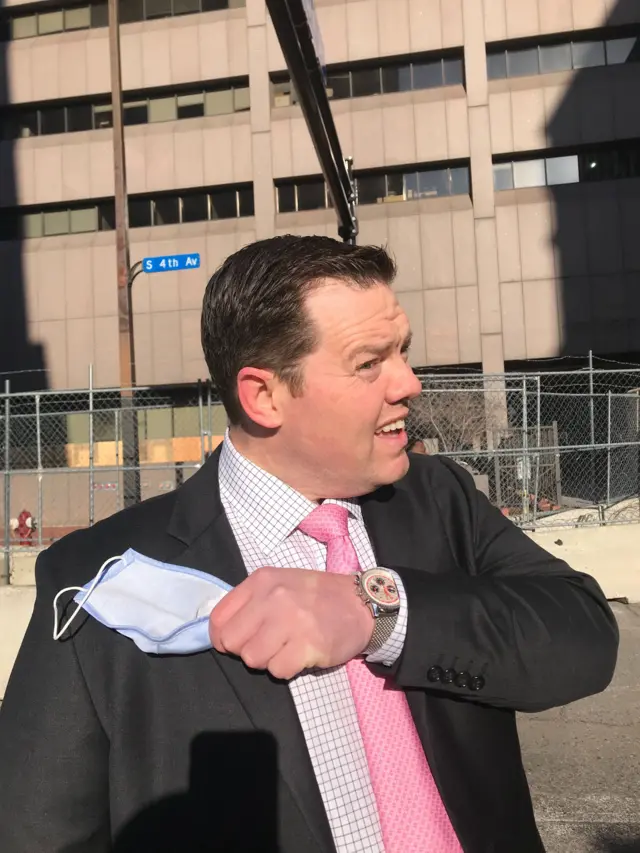
A tall fence surrounds the courthouse. About 2,000 members of the National Guard are poised to help if needed, according to the mayor, along with 1100 law enforcement officials.
People who live here say they are worried about another round of violence and unrest, like the kind that took place after the death of George Floyd in May 2020.
Here on South Fourth Avenue outside the courthouse, I'm speaking with Jeff Storms (pictured), a civil rights lawyer who helped win a massive settlement for the Floyd family. He tells me he is not worried.
“I think we’re confident that people are going to be passionate but peaceful,” he says.
Next to him people are shouting: “Say his name!” Nearby a police siren blasts, a warning for protestors not to block the street. Inside the building, the trial begins.
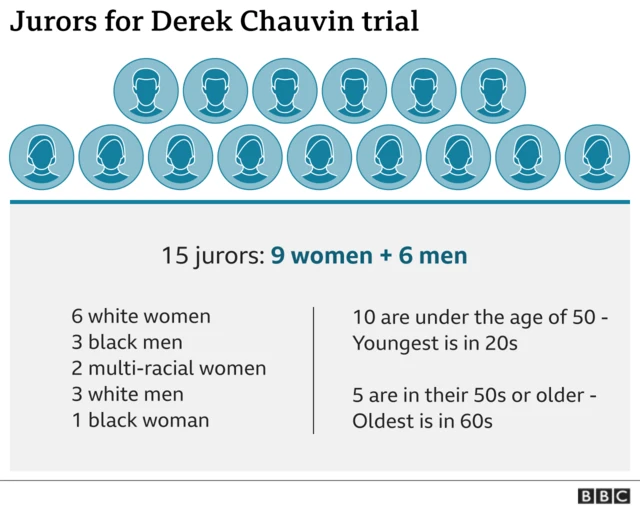
The 14 selected jurors are seated in court listening to the start of the trial.
But we won't be able to see them. Even though the trial is televised live, the jury will remain off camera. Throughout the trial, the jurors will remain anonymous because of the security and safety concerns linked to this high-profile case.
The race of the jury has been a topic of contention. Here's what we do know about the racial make-up of the 15 jurors (including two alternates and one backup)
The jury includes a black grandmother in her 60s - the oldest member of the jury - who said she stopped watching the infamous video of George Floyd's death because "it just wasn't something I needed to see".
Others too admitted that they found the video difficult to watch, with one newlywed white woman, a social worker in her 20s, saying "I had every emotion".
A black man in his 40s said that while he believes minorities are mistreated regularly by the police, he strongly disagreed with defunding - or redirecting funds away from - police departments.
George Floyd opening statement: Derek Chauvin 'betrayed badge'
Corporate lawyer Jerry Blackwell, a founder of the Minnesota Association of Black Lawyers, is giving the opening statement for the prosecution now.
He begins by discussing "what it means to be a public servant", and the "large accountability" that comes with being a sworn officer of the law.
He continues by quoting the officers oath, and says that Derek Chauvin "betrayed this badge when he used excessive and unreasonable force on the body of George Floyd" by "grinding and crushing him" into the ground.
Jurors have been told that they are permitted to take notes, and have been provided pads and pens to write with.
"You should not feel required to do so," the judge says. "The most important thing is you give full attention to the testimony as you hear it."
He reminds them that they are not permitted to have a copy of the court transcript to refer back to during their deliberations.
"We rely on the jury to rely on its collective memory," he says.
Judge Cahill continues: "You are not investigators."
He tells them to not "go out looking" for information on their own, and not to use the internet to settle questions they have about the law.
"You should avoid all news if possible, and at the very least, avoid coverage of this case," he says.
He asks that jurors not tell anyone other than their immediate family that they are involved in such a high-profile case.
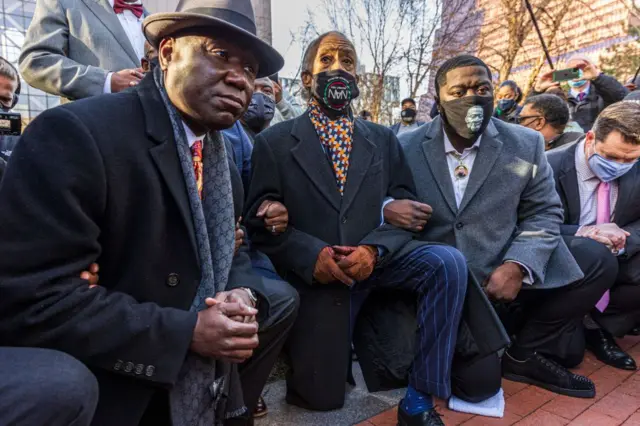 Image source, Getty Images
Image source, Getty ImagesOutside the courtroom, the family of George Floyd and civil rights lawyers and activists took a knee during a news conference before the trial began.
They knelt for 8 minutes and 46 seconds - to symbolise the amount of time that Derek Chauvin kept his knee on Floyd's neck.
The jury has entered the room and has been seated and sworn in.
"You’ll be the judge of the facts. And I’ll be the judge of the law," says Judge Cahill, before asking the panel to raise their hands and swear the oath of secrecy.
Fourteen jurors have been chosen. Twelve Minnesotans, and two alternates who will step in if any juror is forced to leave.
Opening statements, starting with the prosecution, are starting soon.
Read more:
Who are the jurors who will decide the former police officer's fate?
Derek Chauvin has been charged with second-degree unintentional murder, third degree murder and second-degree manslaughter.
The first, and most serious charge, will require prosecutors to prove that Chauvin was assaulting Floyd when he caused his death. Chauvin faces between 10-15 years if convicted on this count.
For the second charge, the jury must be convinced that Chauvin showed a reckless disregard for human life.
For the final charge - second-degree manslaughter - prosecutors will try to demonstrate that Chauvin took an “unreasonable risk” when he restrained Floyd, putting him at risk of death or serious harm.
With the manslaughter charge, prosecutors do not need prove Chauvin actually caused Floyd’s death. The sentence for manslaughter is between three to five years.
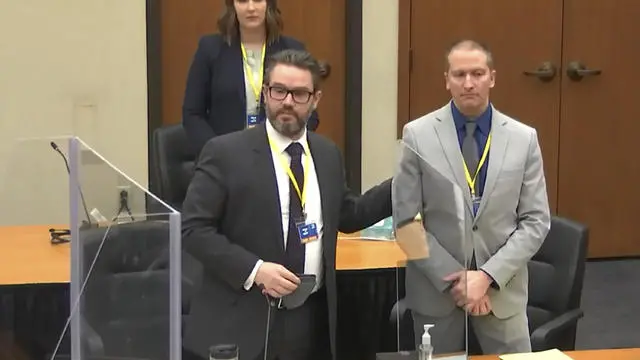 Image source, CBS
Image source, CBSChauvin (right) with defence attorney Eric Nelson
Chauvin’s defence has indicated that they’ll argue that Floyd died of a drug overdose. They will point to the toxicology report that shows Floyd had drugs in his system as evidence that it was not Chauvin's actions that killed him.
Chauvin never spoke to his bosses about what happened, and was fired one day after Floyd’s death.
So his defence arguments, which are not due to begin for two weeks, will be the first time that we hear Chauvin’s perspective on that day.
According to US media, Chauvin had agreed to a plea deal that would have landed him in jail for at least 10 years. The deal was later rejected by federal prosecutors.
Read more:
It's nearly 09:00 in Minneapolis now, and the sun has just risen.
The trial of former officer Derek Chauvin is about to begin.
BBC reporters are across the city - here's what's happening.
Allow Twitter content?
This article contains content provided by Twitter. We ask for your permission before anything is loaded, as they may be using cookies and other technologies. You may want to read Twitter’s cookie policy, external and privacy policy, external before accepting. To view this content choose ‘accept and continue’.
Allow Twitter content?
This article contains content provided by Twitter. We ask for your permission before anything is loaded, as they may be using cookies and other technologies. You may want to read Twitter’s cookie policy, external and privacy policy, external before accepting. To view this content choose ‘accept and continue’.
Allow Twitter content?
This article contains content provided by Twitter. We ask for your permission before anything is loaded, as they may be using cookies and other technologies. You may want to read Twitter’s cookie policy, external and privacy policy, external before accepting. To view this content choose ‘accept and continue’.
The family of George Floyd has gathered outside the courthouse to speak - less than an hour before Derek Chauvin's trial begins.
Floyd's brother, Philonise, says Floyd moved to Minneapolis - the city where he died - hoping for a better life.
Another family member wears a mask with "8:46" written on the front - the length of time that Chauvin knelt on Floyd's neck.
"The shade of your skin shouldn't be a death sentence," he says. "America is watching."
Change is coming to "Brazil, London, and Ghana", he says. "This is just a starting point."
Allow Twitter content?
This article contains content provided by Twitter. We ask for your permission before anything is loaded, as they may be using cookies and other technologies. You may want to read Twitter’s cookie policy, external and privacy policy, external before accepting. To view this content choose ‘accept and continue’.
Samantha Granville
BBC News, Minneapolis
“This case is not hard.”
Civil rights lawyer Ben Crump and civil rights activist Al Sharpton addressed the media ahead of court. They told the media that the US is embarking on a four week journey to justice - the amount of time the trial is expected to take.
They said the Floyd family is deserving of “whole justice and we wouldn’t be questioning the outcome of a trial if it were a black cop and white victim."
Allow Twitter content?
This article contains content provided by Twitter. We ask for your permission before anything is loaded, as they may be using cookies and other technologies. You may want to read Twitter’s cookie policy, external and privacy policy, external before accepting. To view this content choose ‘accept and continue’.
Civil rights lawyer Ben Crump is speaking now on the courtroom steps ahead of Derek Chauvin's trial - which will begin shortly.
Crump rejects the notion that the case against Derek Chauvin is "hard".
"We know if George Floyd was a white American citizen... nobody would be saying this is a hard case," Crump says.
"This murder case is not hard when you watch that torture video of George Floyd."
"We have to call it what it was," he says. "This was torture."
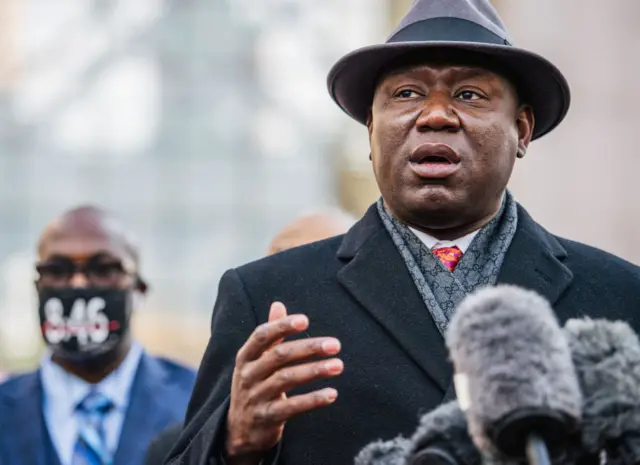 Image source, Getty Images
Image source, Getty ImagesAllow Twitter content?
This article contains content provided by Twitter. We ask for your permission before anything is loaded, as they may be using cookies and other technologies. You may want to read Twitter’s cookie policy, external and privacy policy, external before accepting. To view this content choose ‘accept and continue’.